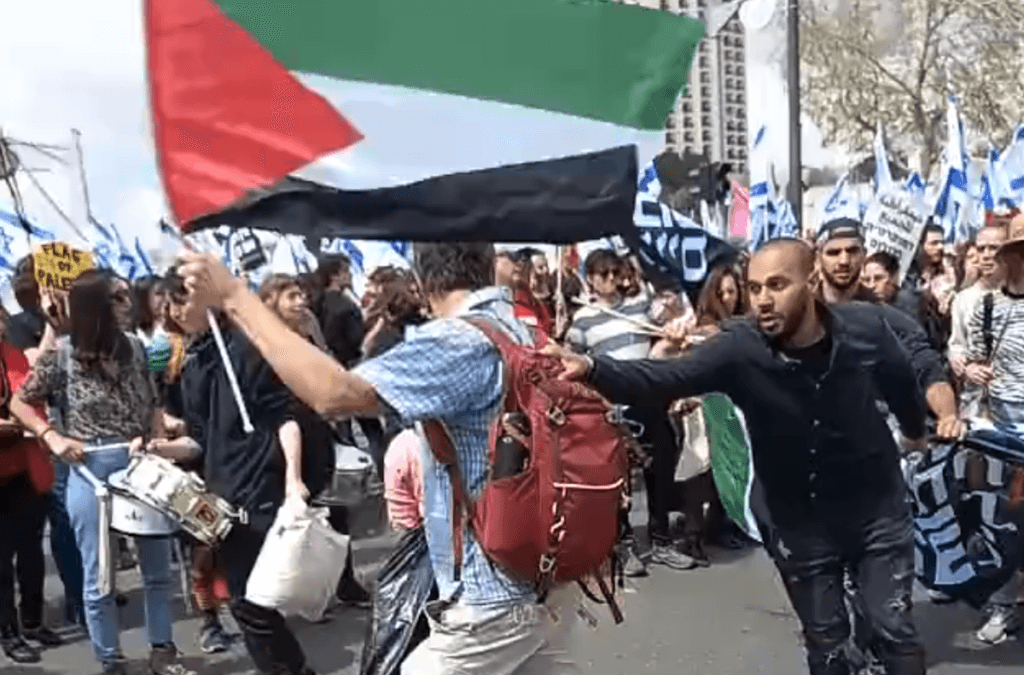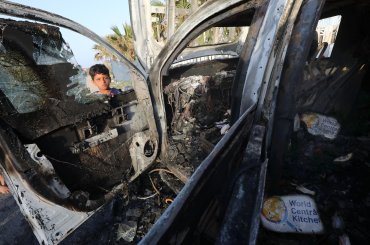Here’s a revealing video from Jerusalem, at one of the massive demonstrations that are shaking Israel’s far-right wing government. Note the sea of Israeli flags in the background, characteristic of the weeks of protest so far. And then watch what happens when some brave soul unfurls a Palestinian flag, perhaps to test Israel’s “democracy.” His attackers look like a combination of security officials and possibly other bystanders. This is yet another sign of Israeli apartheid.
It is a mistake to dismiss the nationwide protests in Israel as insignificant. In the mainstream U.S. press, Netanyahu is getting by far the most negative coverage that I can recall any Israeli government ever receiving in my (long) lifetime. But the U.S. media, so far, is (unsurprisingly) missing one key element of the story: the shockingly different ways that the Israeli police and military treat Jewish and Palestinian protests.
A brief New York Times snippet today (by Raja Abdulrahim) does note that Israel’s Palestinian citizens “have largely stayed on the sidelines” in the current protest wave. But the brief mini-article asserts that the Palestinian lack of interest is because “the demonstrations have ignored issues important to them, such as ending the occupation of the West Bank.”
This is undoubtedly true, but incomplete. You have to turn to Odeh Bisharat, a Palestinian who writes a regular column in the Israeli daily Haaretz, for more. Bisharat explains how he joined a pro-democracy vigil (of both Jews and Palestinians) in his town of Yafia. A pointed question from a young Palestinian passer-by prompted Bisharat to analyze how Israel’s authorities react differently depending on who is protesting.
Here is his comparison. He noted that last Thursday, overwhelmingly Jewish protesters staged a nationwide day of paralysis, blocking roads and preventing ministers from speaking at conferences:
By the end of this stormy day, 108 protesters had been arrested, of whom 100 were released that same day and the remainder the next day.
Bisharat then recalled nationwide protests back in May 2021, which were predominately carried out by Palestinian citizens of Israel. That time,
. . . 3660 Arabs were arrested and 350 were indicted. The sentences were monstrous — months and sometimes even many years in jail. Even those lucky enough not to be charged sat in jail for weeks and sometimes months before they were released.
Peter Beinart made a similar point in a tweet. Anshel Pfeffer, a prominent Jewish Israeli journalist, said he was thankful that “there has been no bloodshed in any of the pro-democracy protests.” Beinart responded:
Do you think that fact that there’s been no state violence against the protesters has anything to do with the fact that it’s Jews protesting and not Palestinians?”
At least the New York Times did mention Palestinians, even in passing. The latest Washington Post coverage has no mention of Palestinian citizens of Israel at all, even though they constitute a fifth of the population inside Israel’s 1967 borders. And National Public Radio’s report this morning was characteristically inept.



This should come as no surprise, but reading the Twitter comments shows that Israeli society is not concerned with Palestinians and does not regard them as humans who deserve acknowledgment. Comments like, “How’s the Palestinian flag even related?” indicate a serious lack of regard for Palestinians.
It is as though the occupation is an external matter, a matter of “foreign” policy, nevermind that 20% of Israel’s citizens are non-Jewish and Palestinian, who are second class citizens. In the context of these protests, the only rights that are of any concern to Israeli society are the rights granted to and bestowed upon the Jewish Israeli population.
That video is so telling….the Israeli citizens echo the same tone that their many governments/leaders have set and followed…the Palestinians who have suffered for decades under inhumane conditions, do not have a say, nor are their valid grievances worthy enough of protests. To the Israeli people, they are subhuman and should feel no pain. THEY are the entitled ones.
When the Palestinian youth protest, they are killed by snipers.
Huge difference.
Is it antisemitic according to IHRA for Israelis to publicly claim that right-wing MK’s are attempting to destroy Israel as a Jewish state?
Is it antisemitic according to IHRA to create posters labeling the “judicial reforms” in Israel as “undemocratic” and a “coup”?
Is it antisemitic according to IHRA to stage oppose “judicial reforms” in Israel ONLY without also demanding similar reforms in every other country?
Is it antisemitic according to IHRA to encourage hi-tech companies to exit Israel and re-invest in some other country?
Is it antisemitic according to IHRA to depict ONLY duly-elected Israeli officials as tyrants, thieves, corrupt, racist and cruel without also condemning all other elected officials everywhere else in the world?
Is it a violation of any of the US’s 30+ state-level anti-BDS laws to protest any effort of any hi-tech company leaving Israel to re-establish itself in the US?
Conversely, is it a violation of any of the US’s 30+ state-level anti-BDS laws to actively encourage any hi-tech company leaving Israel to re-establish itself in the US?
Note: All the posters linked above were created by Israeli artists in opposition to the “Secular Intifada” taking place all over Israel right now. The posters, and the artists, are all fiery, outspoken, irreverent, and utterly indifferent to political, social or cultural niceties. To my knowledge, not a single Israeli poster artist has been arrested or prevented from carrying or distributing any of the posters at any rally: One could reasonably wonder if the authority’s delicate and considerate response would apply if it were Palestinians who were designing and printing these posters?
Question for Any Zionist: Is it antisemitic according to IHRA compare Israel’s current leadership to that of other countries with strongmen as leaders – Russia, North Korea, Philippines, Egypt, Turkey, etc.?
View here 62+ posters from the Secular Intifada movement in Israel
PS: Brent and Yonah: PLEASE feel free to cherry pick anything said in any poster or in anything I have written here so that you can say you “stood up for Israel”. We know that is important to you and we are sure you’ll find something. We’ll wait.
I will agree with Brent to the extent that the Palestinians do need to work on making their cause understood to the people of the United States.
But I see serious difficulties with this. The most effective approach would be to engage an American public relations company to help, but can American public relations companies be trusted? Might they not deliberately give bad advice? Even if they did not want to, there would be powerful external pressures to do so.
Another difficulty is the danger of falling into the morass of fashionable nonsense that takes up a large part of American public discourse, and being tainted by association. The goal should be to gain the support of the majority of Americans, and being linked to drag queen story hours or the dubious finances of BLM will be an obstacle to that goal.
Response to Airlane 1979
You said: “Punishing the Jewish, Arab and other workers of Israel – and BDS like US sanctions against other nations punishes the working class more than its rulers – merely entrenches resentment against those directly responsible: the BDS movement which is comfortably unaffected.”
You seem to freely give unsolicited advice to Palestinians at every turn and yet you seem to be woefully under-informed about reality on the ground in Palestine. For one thing, while there may be historical examples – Cuba perhaps wherein the ruling class has insulated itself from the harshest effects of the embargo – there are plentiful counter examples such as South Africa where the anti-apartheid forces – black and white – clamored for the world to boycott the country and not to worry about its effects on the working class. It was the workers themselves who were calling for the boycotts … just as in Palestine. So come down from your perch and learn more about the issues and the people involved. It is also the case that here in the US auto workers unions, mining unions, shipping and docking unions, and many others have called for the boycotting of their own companies/industries (Amazon/Starbucks for example) and willingly endured the hardships associated with boycotts and strikes because they were fighting the long fight.
I find your analyses and commentary insincere and poorly researched. It reads like opinion and comes across as virtue signaling. Read more history.